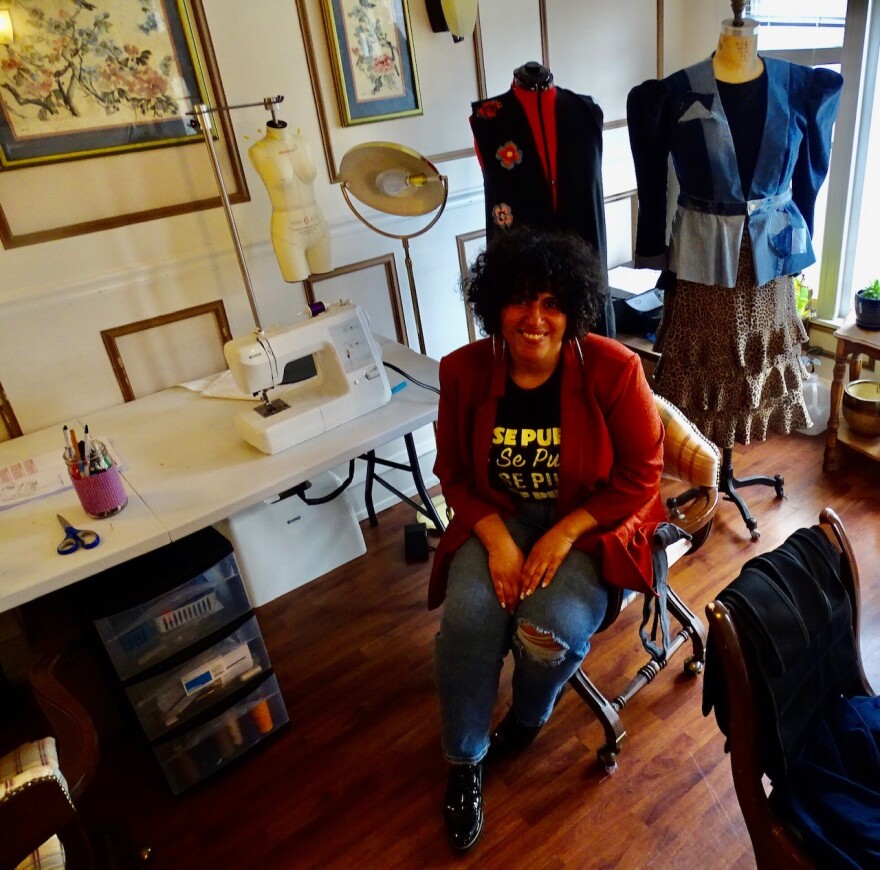Dealing with climate change is critical for the planet’s future. Individual actions add up, including consumer decisions about fashion.
Textile mills were once plentiful in the United States. Then massive mills and clothing factories took hold in China and other Asian and Latin American countries.
For American consumers, clothing became cheaper and increasingly less durable. Now, our clothing universe is largely dominated by what’s called fast fashion.

Vanessa Andrew is trying to shift the tide.
Her West Allis business is called Madam Chino, named for a name on a T-shirt she picked up at a thrift shop. “I altered it. It was one of the first things I’d altered,” Andrew says.
The garment hangs in a place of honor in her shop, along with racks and racks of what Andrew calls a ”forest” of colorful options. Some are vintage. Others she made from repurposed fabrics.
“These are all handmade from recycled wool that was collected by somebody and given to somebody else who then gave it to me,” Andrew explains.
Andrew created coats from beautiful pieces of wool that might otherwise have ended up in a landfill.
“I patchworked everything in this method called improvisational patchworking and then I freestyle cut them into these coats, and they’re all a little unique,” Andrew says.
The clothing Andrew designs is just one of the three strategies she employs at Madam Chino to battle fast fashion.
She also alters existing pieces to give them new life and longer wearability. And she teaches sewing classes featuring, of course, making something new out of recycled materials.
It’s not the career path Andrew anticipated. She graduated from UWM in 2005 as a painter.
In fact, Andrew had no interest in fashion, saying she was turned off by the consumption and waste, "because I felt like it’s very socially irresponsible, it’s all focused on how you look, it’s more vanity based,” she says.
But Andrew realized the role she could play by altering clothing people already owned.
“You’re helping them look good and feel good in the clothes that they’re wearing. So, helping people and being sustainable were what made it kind of come together for me, this is what I want to do,” she says.
Andrew thinks of the teaching component as the final piece of a sustainable loop.
“It’s about self-sufficiency, to be able to do things yourself...trying to just get people to reuse their items and make them last longer and feel empowered that they can make their clothes fit,” Andrew says.
Five miles north of Madam Chino, Iris Acevedo has some things in common with Vanessa Andrew.

In her sunny sewing room, Acevedo alters clothing and creates garments by upcycling.
“This one I did at the end of last year. And this jacket, I did from some old jeans. I cleaned out my closet and instead of just donating them. It took about four pairs,” Acevedo says.
Acevedo teaches courses in Mount Mary University’s fashion program. That’s where she finds hope for the future.
“I’m teaching textiles now, and once we really get into natural fibers, especially when we start exploring that, it’s amazing to see how many small startup brands are going towards more sustainable resources and sustainable materials, that are just more respectful to the Earth,” Acevedo says. “So there are people coming up who are trying to be more thoughtful about how they approach design, and so that’s exciting.”

Mount Mary junior Rachel Gantz, one of Acevedo’s former students, would like to think she’ll be one of those people.
“Definitely, coming into school, fast fashion had been on my mind as something that I’ve been trying to slowly not support. As a designer, I want to create something that is timeless and will last and not just end for a season,” Gantz says.
But for now, Gantz must complete her spring design project.
She and her classmates were challenged to create what Gantz hopes becomes something elegant from a collection of donated quilt pieces.








